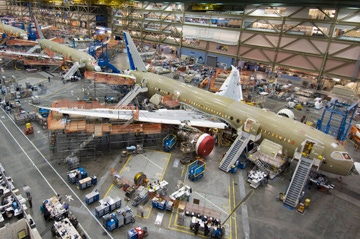New Titanium Alloy Will Lighten Airframes
February 25, 2010

Testing is now being completed on a new titanium alloy thatwill lighten aircraft frames. ATI 425 offers reduced weight both throughimproved performance and ability to reduce gauge, according to its developer,Allegheny Technologies Inc. of Pittsburgh.
"Results are better than we anticipated," says RichHarshman, chief financial officer of ATI. He adds there is significantinterest in use of the new alloy, which was originally developed for armorplate on military vehicles. It will be introduced to aerospace markets at the FarnboroughAir Show this July in Hampshire, England.
ATI 425 has a lower forming temperature than the material itmay replace, 6-4 Ti (Ti-6Al-4V), and is being produced in a modern cold-rollingfacility in Louisville, OH.
The newest designs in airframes rely heavily on lightweightmaterials such as titanium. The materials' contentof the Boeing Dreamliner 787, for example, is 15 percent titanium. The amountof titanium used on the Dreamliner increased when titanium fittings were usedto strengthenthe wing attachment to the fuselage in 2008.
ATI has a strategic long-term supply agreement in place withBoeing, but it's not known if ATI 425 is being used on the Dreamliner.
Good workability
A key strength of ATI 425 titanium is that it iscomparatively easy to produce and form due to its workability during theproduction and forming processes. ATI says duplex annealed ATI 425titanium plate exhibits good fracture toughness; cold rolled and annealed ATI425 titanium sheet has been bent to radii of 2.5 times its thickness. Thecompany reports ATI 425 titanium is also heat treatable and can besolution-treated and aged to create higher strength levels. The alloy isreadily weldable.
Development of specialty alloys such as 425 is part of acorporate strategy at ATI to move from commoditized metals such as standardstainless steel to higher value metals, many of which are titanium or nickelbased. In recent years, the company has invested $1.3 billion of internallygenerated funds to renew and expand annual titanium sponge production capabilitiesto approximately 46 million lbs; expand premium titanium alloy melt andremelt capacity; expand nickel-basedalloy and superalloy melt and remelt capacity; expand titanium and specialty alloy plate capacity,and expand premium titanium and nickel-based superalloy forging capacity.
The primary end-market segments for its high-performancemetals are aerospace and defense, the chemical process industry, oil and gas,electrical energy and medical. There are only four major airframe producers:Boeing, Airbus S.A.S (an EADS company), Bombardier Aerospace (a division ofBombardier Inc.) and Embraer (Empresa Brasileira de AeronAiutica S.A.).
The primary global producers of nickel-based and otherspecialty super alloys are ATI, Carpenter Technology Corp., Special Metals Corp. (a PCC company), HaynesInternational and ThyssenKrupp VDM GmbH. The major suppliers of titanium are ATI, Titanium Metals Corp., RMI Titanium (an RTI International MetalsCo.) and VSMPO - AVISMA (Russia). Boeinghas a joint venture agreementwith the Russian supplier to provide components for the Dreamliner. 
New Titanium Alloy Will Lighten Airframes A
About the Author(s)
You May Also Like



.jpg?width=300&auto=webp&quality=80&disable=upscale)

